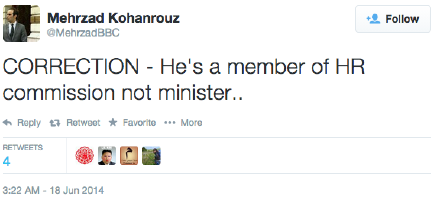Tactic 6: Own Your Errors
Even after making every effort to identify sources, verify information, and double-check copy, mistakes can still happen. And when reporting and publishing are done in real time, as in the case of live-tweeting, the chances of error are higher.
Journalists should be readily accountable for their mistakes, acknowledging and correcting them as quickly and as clearly as possible. If the error appeared on Twitter, Facebook, and your own website, the correction must also appear in all of these places. Responsibility doesn’t stop with your own errors. If you are a reporter following a story on Twitter and you see misinformation being published, you need to jump into the conversation and correct it. Unfortunately, Twitter does not make it easy to correct errors and rumors, but journalists should do their best to fight the spread of misinformation– especially on their beats and within the stories they are covering.45

image
People who have retweeted or shared an erroneous post you made may not see your subsequent correction unless you reach out to them individually. Check for retweets, likes, or re-shares and then make sure everyone who spread your error gets a copy of the correction.
That’s harder to do if a tweet has been widely retweeted. One method for dealing with Twitter mistakes is to issue the correction as a reply to the original erroneous tweet, as Slate did when it posted a photo of Javier Bardem in a tweet about Russian president In June of 2014, a BBC journalist tweeted a screenshot of a tweet from someone he identified as “Saudi Human Rights Minister.”
I replied to him with a correction: Saudi Arabia doesn’t have a human rights ministry.
The journalist later posted a correction, but while his original tweet was retweeted more than seventy-five times. His correction was only retweeted four.
0.45 
The correction
0.45 
The correction
Securing Your Work
Journalists have a responsibility to keep sources safe from the risks posed by using the Internet for communications. An application like Skype may be a great way to reach someone in a far-off place, but it may also give a repressive government or other hostile party an opportunity to spy on that source.